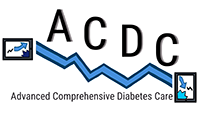Takeaway: Data from across two randomized trials and implementation at more than 30 VA facilities show that the Advanced Comprehensive Diabetes Care (ACDC) program improves hemoglobin A1c (a measure of blood glucose) compared to clinic-based usual care and standard Home Telehealth diabetes services. In real-world use, ACDC lowers A1c by 1.65% (n=1,154 Veterans), and Veterans maintain this benefit for as long as four years after finishing the program. Because ACDC was specifically designed to use only existing VA staffing and infrastructure, it can be easily implemented at any VA site. A “Dynamic Diffusion Network” implementation strategy helps new sites access support from peers and from experienced sustaining sites.
According to the Centers for Disease Control and Prevention (CDC), more than 37 million Americans (11% of the U.S. population) have diabetes and another 96 million (38%) have prediabetes. Diabetes is even more prevalent among Veterans, affecting nearly 25% of VA’s patient population. Diabetes is the leading cause of blindness, end-stage renal disease, and amputation among Veterans in the VA healthcare system (VA Research on Diabetes).
 VA works continuously to improve the health and care of Veterans with chronic diseases, including diabetes. For example, VA’s Advanced Comprehensive Diabetes Care (ACDC) program is a six-month telehealth program for Veterans with persistently poor control of type 2 diabetes (varies by site, typically ≥8.5%), despite the use of VA services. ACDC uses existing VA telehealth staffing (nurse administered) and equipment to deliver diabetes self-management support and clinician-guided medication management. So far, data from two randomized trials show that ACDC improved hemoglobin A1c (a measure of blood glucose) compared to clinic-based usual care and standard Home Telehealth diabetes services; in real-world use at 30+ VA sites, the ACDC intervention lowered A1c by 1.65% among 1,154 Veterans, who maintained this benefit for as long as four years after finishing the program. Because ACDC was specifically designed to use only existing VA staffing and infrastructure, it can be easily implemented at any VA site.
VA works continuously to improve the health and care of Veterans with chronic diseases, including diabetes. For example, VA’s Advanced Comprehensive Diabetes Care (ACDC) program is a six-month telehealth program for Veterans with persistently poor control of type 2 diabetes (varies by site, typically ≥8.5%), despite the use of VA services. ACDC uses existing VA telehealth staffing (nurse administered) and equipment to deliver diabetes self-management support and clinician-guided medication management. So far, data from two randomized trials show that ACDC improved hemoglobin A1c (a measure of blood glucose) compared to clinic-based usual care and standard Home Telehealth diabetes services; in real-world use at 30+ VA sites, the ACDC intervention lowered A1c by 1.65% among 1,154 Veterans, who maintained this benefit for as long as four years after finishing the program. Because ACDC was specifically designed to use only existing VA staffing and infrastructure, it can be easily implemented at any VA site.
VA’s Office of Rural Health (ORH) began supporting ACDC in 2017. ACDC was named a Diffusion of Excellence Promising Practice in 2018 and was designated an ORH Rural Mentored Implementation Program in 2020. Since then, it has been implemented at more than 30 VA sites. In addition, VA’s Center for Care and Payment Innovation is developing a pilot study that includes aspects of ACDC and brings pharmacists and endocrinologists together in a weekly huddle to review emergent medication needs for Veterans with type 2 diabetes, with a goal of providing comprehensive services and increased care team access and coordination to improve health outcomes for Veterans. |
The Dynamic Diffusion Network (DDN) QUERI Program (DDN QUERI) works to expand evidence-based practices in diabetes and moral injury care (through a network of mental health/chaplain-led sessions for Veterans experiencing moral injury). As part of these efforts, QUERI investigators worked with the VHA Innovation Ecosystem to implement ACDC across 10 new VA facilities. Since then, the DDN implementation strategy has helped additional sites access support from peers and from experienced sustaining sites, with nine of the 30+ sites where ACDC has been implemented being added through a DDN trial.

Matthew Crowley, MD, MHS
“By providing special support to Veterans whose diabetes remains poorly controlled despite receiving standard VA diabetes care, ACDC empowers Veterans to achieve improved control, better self-management, and a positive experience. The DDN QUERI Program builds on ACDC’s prior success and expands our understanding of how to implement this intervention most effectively.”—Matthew Crowley, MD, MHS, Multiple Principal Investigator, DDN QUERI, and investigator with HSR’s Center of Innovation to Accelerate Discovery and Practice Transformation (ADAPT), Durham, NC
ACDC is proven to lower hemoglobin A1c among Veterans with refractory poor control in research and clinical settings. It is effective enough to reduce VHA type 2 diabetes costs and complications. Because ACDC uses only existing VA staffing and infrastructure and requires minimal training, any VA healthcare facility can deliver the program. These qualities make ACDC ideally suited for implementation in clinical practice (including in rural areas) and broad dissemination across the VA healthcare system.
“Some of our sites have now been delivering ACDC in clinical practice for up to four years, which indicates that this approach can be sustained in clinical practice. Also, despite the drastic changes COVID-19 forced healthcare systems like VA to make, ACDC delivery continued unabated during the pandemic. ACDC is making a strong impact within VA, but one important question is whether the ACDC approach can be translated beyond [VA]. We are engaged in work to help answer this question.”—Elizabeth Kobe, MHS, Duke University School of Medicine
Weppner WG, Jeffreys AS, et al., and Crowley MJ. Reconsidering the Impacts of Heath Care Through a Decarbonization Perspective: Evaluation of a National VA Diabetes Telehealth Innovation. NEJM Catalyst Innovations in Care Delivery. 2024. (In press.)
Green JB, Crowley MJ, Thirunavukkarasu S, et al. The Final Frontier in Diabetes Care: Implementing Research in Real-World Practice. Diabetes Care. August 1, 2024;47(8):1299–1310.
Crowley MJ, Tarkington PE, Bosworth HB, et al. Effect of a Comprehensive Telehealth Intervention vs. Telemonitoring and Care Coordination in Patients with Persistently Poor Type 2 Diabetes Control: A Randomized Clinical Trial. JAMA Internal Medicine. September 1, 2022;182(9):943–952.
Kobe E, Lewinski A, Jeffreys A, et al. Implementation of an Intensive Telehealth Intervention for Rural Patients with Clinic-Refractory Diabetes. Journal of General Internal Medicine. September 2022